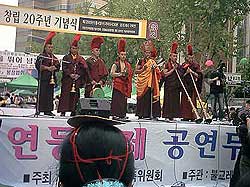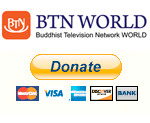
|
|
|
Home Asia Pacific North Asia S/N Korea Arts & Culture Lotus Lantern FestivalPhayul, By Tenzin Norlha and Angus Cargill, May 10, 2005Seoul, South Korea -- Tibet received another boost to its international standing on Sunday (8th May) when thousands flocked to the center of Seoul, capital of South Korea, to celebrate the Lord Buddha's birthday at the "Lotus Lantern Festival." Lungta (Tibetan flag) spanned the street and the white yak's head nestled between the flags of free Tibet and Buddhism above an exhibition stand organized jointly by monks from Lhodrup monastery in Nepal, one of Korean Tibet Support Group - Think Tibet (http://www.Thinktibet.com) and Tibetan Smile members in Korea.
While the monks performed sacred chants and constructed a colorful sand Mandala, Tibetans and local supporters wearing Tibetan traditional national dress gave information about the country to visitors from all over the world who thronged the display for more than eight hours. An intricately painted reproduction Chorten made by the members of local Tibetan support group "Thinktibet" was the center of attention alongside displays featuring HH the Dalai Lama, life inside Chinese-occupied Tibet and a wide range of Tibetan cultural items from clothes to Thankas and Tibetan medicine. Tibet joined Korea, Cambodia, Sri Lanka, India, Nepal and Buddhist organizations ranging from the International Buddhist Youth Federation to the Korean Campaign for the Dalai Lama's Visit to Korea in mounting a display of its national religious traditions. Buddhism celebrated the birthday of its founder with cheerful and colorful performances of traditional Korean dancing, martial arts and dynamic meditation, and the afternoon was rounded off by a parade of Buddhist groups through the normally traffic-choked streets of central Seoul. A multiracial, multicultural crowd carrying specially made "lotus lanterns" and followed by huge illuminated images of white elephants, stupas, and scenes showing the important events of the Lord Buddha's earthly life wound through the streets all evening, cheered and clapped by enthusiastic onlookers. Founded to celebrate the traditional religion of Korean response to the recent influx of Christian missionaries, the festival showed that Buddhism is flourishing in one of Asia's wealthiest and most dynamic economies. A leader in the rise of Asia's economic power, Korean Buddhism has been prominent in the increase of its cultural influence too, with many monks and nuns from the US, Canada and Europe joining its religious orders in recent years. |
 |
|
| Korean Buddhist News from BTN (Korean Language) |
|
 |
|
|
Please help keep the Buddhist Channel going |
|
| Point
your feed reader to this location |
|

 << Photo courtesy ThinkTibet.com
<< Photo courtesy ThinkTibet.com

